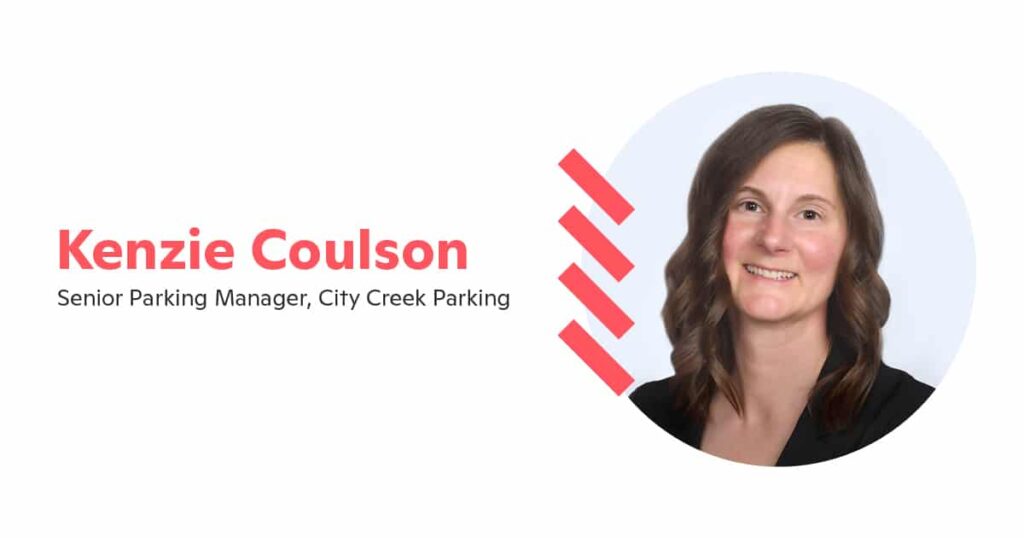Historically, mobility, smart cities, and parking have been male-dominated industries, but as these industries evolve, women are playing a significant role in the future of these industries. Only one-third of entry-level hires are women, and five male C-suites exist for every female in infrastructure. However, you can bet that things are changing. It’s time we shine a light on the impact that women are making and empower them to excel in an industry that acutely affects how we live.
In this part of our interview series speaking with three female leaders in mobility, we spoke with Kenzie Coulson, Senior Parking Manager at City Creek Parking.
Lead the Charge
A FREE eBook breaks down the numbers behind the EV revolution and highlights parking’s critical role in the big picture. Hint: there’s a big opportunity you don’t want to miss.

Kenzie Coulson, Senior Parking Manager, City Creek Parking
Kenzie Coulson learned how much she enjoyed leading challenging operations after working in an Alaskan wilderness lodge and managing a situation where a staff member drove a bus into a ditch. After hopping into action and coordinating a rescue, Coulson was immediately promoted, expanding her interest in leadership. She then went on to manage a small FedEx terminal, and then the transportation and parking for the Sundance Film Festival.
Today, Coulson works on technology-related projects in Salt Lake City. She manages daily parking, technology, and maintenance operations, which includes about 13,000 spaces and 600 cameras. Coulson is also directly involved in the future of parking as she’s responsible for implementing cloud-based software.
1). The new administration will be making massive shifts to our infrastructure. How do you see some of the initiatives for clean power and renewable energy affecting the future of infrastructure and mobility?
The creation of environmental sustainability goals is important for pushing the industry forward. These goals will certainly help embrace some of the work that’s already happening in the mobility field. Often people talk about parking, but the word parking is very narrow and negative. For parking to be successful and sustainable, we need to think more broadly about mobility and our culture’s reliance on cars.
So, the transit planners of this world already developed many beautiful ideas surrounding transportation and management. Meanwhile, the tech industry is coming to the table, and they continue to push for creative ideas for mobility.
2). How has your organization been preparing for these shifts so far?
My current operation has always been interested in staying on the cutting-edge of technology and investing in EV charging stations. What we see at this moment is that we don’t manage curb space, exactly. However, the trends in transitioning the curb are now affecting our garages. We’re seeing many activities that require space for delivery vehicles and additional drivers and curbside pickup.
In the coming months, we will need to assess how to handle this new activity in the garages. How do we create new rules and new processes? How do we monetize and/or quantify revenue loss related to these new trends? I’m grateful to be working for an organization interested in utilizing technology as a means of understanding data trends and moving toward a future where we’re using that information to be pliable.
3). If infrastructure policies will be trickling down to municipalities, how important will it become for mobility operators to partner with and learn about municipal policies and urban planning?
There are infinite opportunities, and each city and neighborhood has unique mobility needs. So, this is the trigger right here: when there’s a new policy that affects planning, and then that trickles down to the reality of the street. Meaning: how we imagine a policy to affect us just may not be the reality of what happens. It’s going to be extremely important that we’re staying connected and also creating additional dialogue around these issues.
“Ultimately, I think confidence is key. It's what has allowed me to work in an industry where I never had female mentors.”
Kenzie Coulson, Senior Parking Manager, City Creek Parking
4). Infrastructure and parking are historically male-led sectors and industries. How have you overcome this status quo and addressed the challenges you’ve faced along the way?
Well, I believe I was born confident. I was brought up in a loving household where I always felt safe. My parents told me I could do anything and everything, and I believed them. But, it is a little bit emotional, especially in the media, seeing the female Vice President. She’s going to inspire thousands of young women to think bigger and broader about what they might do.
Ultimately, I think confidence is key. It’s what has allowed me to work in an industry where I never had female mentors. Historically, I haven’t been that interested in talking about inequality. I preferred, in the past, to sit at the table, do the work, be a strong leader, and just inch myself in there. In the future, I do hope that I can inspire women, and especially younger women, to think more broadly about what they might do.
5). What advice would you give to aspiring female leaders to help them reach leadership roles?
Number one, embrace confidence. Don’t let yourself get stuck in moments of fear or scrutiny. I have had plenty of moments where I’ve felt that I wasn’t being listened to or taken seriously. It’s not constructive to get stuck on those moments. At the same time, it’s important to acknowledge fear and translate it to excitement and energy. And the goal is to compartmentalize the fear in a way that doesn’t allow it to consume in any negative way.
Because when you boil it down, that’s what we’re talking about: fear. Can I work in this field? Can I do a big project? Yeah, I think we all can, and we just have to overcome this obstacle in our minds.
6). What do you think companies should be doing to help to challenge the status quo and encourage workplace diversity for the next generation of leadership?
Of course, it’s important to have women in key roles. But also important, in this cultural moment, I don’t know that we are embracing our working folks as much as we could be. Often in my projects, I’ve seen a company create a mission, or create what they think will be their culture, and then that doesn’t connect very well with those who actually perform the work. So, what I’ve enjoyed about many of my projects is that I’ve been able to bridge that idea of what a company wants to be versus what actually is happening with the worker.
I feel strongly that middle management is so important because we need to embrace those who are working for us. We should help them feel safe and help them want to be the best that they possibly can in the work environment. In doing so, we’ll see more women rise up by embracing our folks better. It’s a real gap in my experience, so I hope we can do better in the future.
Join the Parking Revolution, Subscribe
to Our Newsletter
We’re disrupting the parking industry because we believe our customers, consumers, and cities deserve better.

